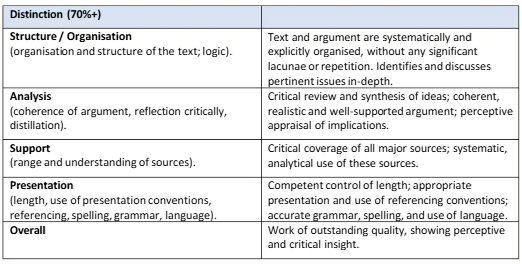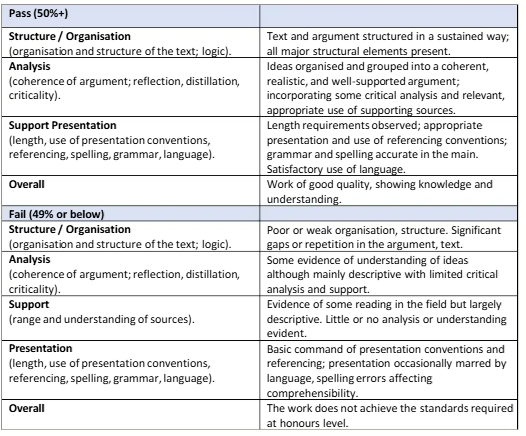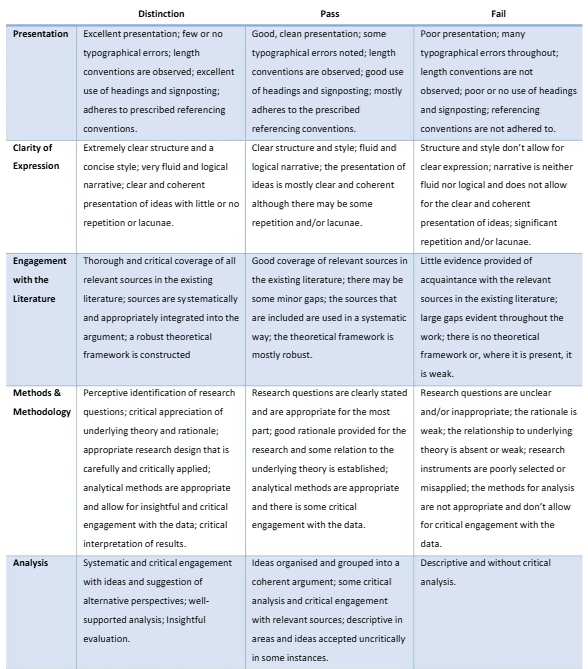| Category | Dissertation | Subject | Education |
|---|---|---|---|
| University | Trinity College Dublin | Module Title | Master in Education |
| Word Count | 15000 Words |
|---|---|
| Assessment Title | Handbook |
| Academic Year | 2024-25 |
| Deadline | September 2025 |
1. Introduction
1.1. Welcome Message from the Head of School..
1.2. Welcome Message from the Master in Education Office..
1.3. About This Handbook.
1.4. School of Education
2. General Information..
2.1. Master in Education (M.Ed.) Office....
2.2. Staff Contacts...
2.2.1. School of Education - M.Ed. Office
2.2.2. School of Education - M.Ed. Strand Leaders.
2.2.3. Other Useful Contacts..
3. M.Ed. Aims and Learning Outcome....
3.1. Taught Component of the M.Ed.
3.2. M.Ed. Dissertation
3.3 Marking Scheme for Module Assignments..
4. M.Ed. Course Structure..
4.1. Course Outline
4.2. The M.Ed. Dissertation Module
5. Academic Credit Ratings
5.1. Distribution of M.Ed. Credits.
5.2. Recognition for Prior Learning (RPL).
5.3. Total Student Efforts (Hours).
6. Student Attendance.
7. Assessment..
7.1. Assessment Regulations.
7.2. Modes of Assessment
7.3. Assessment Criteria
7.4. Submission of Coursework..
7.5. Deadlines for Module Submissions 2024/25
7.6. Request for Extension to Submit Coursework..
7.7.Late Submission and Word Limits...
7.8. Dean's Grace...
7.9. Request to go Off-Books.
7.10 (a) Overview of Grading
7.10 (b) Processing of Module Assessments..
7.11. Examination of the M.Ed. Dissertation.
7.12. M.Ed. with Distinction.....
7.13. Dissertation Referral
7.14. Academic Integrity....
7.15. Academic and Language Writing Support Sessions.
8. M.Ed. Dissertation Year.
8.1. Course Structure...
8.2. The Dissertation.
8.3. Supervision.........
8.4. Working with your Supervisor.
8.5. M.Ed. Dissertation Progress Report Form
8.6. Research Ethics.
8.7. Your Dissertation in Tara
9. The Student Experience...
9.1. Teaching and Learning..
9.2. Student Representation...
9.3. Programme Evaluation and Development..
9.4. Postgraduate Advisory Service (PAS)...
9.5. Request for Rechecks and Appeals...
9.6. Award Ceremonies.................
9.7. Library Access....
9.8. Support Services.
9.9. Graduate Students' Union (GSU)..
9.10. Further Professional Development: Postgraduate Research Degrees
10. Course Calendar.
10.1. Academic Literacy and Research Methods (ALRM).
10.2. Dissertation Year.......
Appendix 1: Assignment Cover Sheet..
Appendix 2: Guidelines for Planning and Writing Assignments..
Appendix 3: Assignment Grading Criteria.
Appendix 4: Referencing..
Appendix 5 Dissertation Submission Guidelines...
Appendix 6: Student Module Review Form.
Appendix 7: Library Resources....
Appendix 8: Internal Examiner Dissertation Report Form.......
Appendix 9: M.Ed. Dissertation Progress Report Form.....
Each student will complete three written (or equivalent) strand module assignments of approximately 4,000-5,000 words and one written strand module (or equivalent) assignment of approximately 2,500 -3,500 words, which are all graded as Distinction, Pass, or Fail, with the Pass level being set at the notional equivalent of 50% or higher, and a Distinction being set at the notional equivalent of 70% or higher. In addition to the strand module assessments, students will complete a written (or equivalent) assignment of approximately 1,500 - 2,000 words for the compulsory Academic Literacy and Research Methods module; this will also be assessed on a Distinction, Pass, or Fail basis. To progress to the Dissertation stage of the course, a student must achieve a Pass (or Distinction) grade in each of the five taught modules.
A student is permitted to resubmit the coursework for failed modules, amounting to no more than 30 ECTS throughout the programme. A re-submission is capped at the Pass grade. Compensation between modules is not permitted. A student who fails on resubmission may be required to withdraw from the course.
The Dissertation module consists of a 15,000-word supervised Dissertation graded based on Distinction, Pass, or Fail. The maximum word count of 15,000 includes any appendices, whether in MS Word format or appendices that are in scanned/ PDF format. References and preliminary pages are not included in the word count. Preliminary pages include pages such as Title Page, Declaration, Abstract, Summary, Acknowledgements, Table of Contents, List of Tables and Figures, Lists of Abbreviations, and Lists of Appendices. A student who achieves a Distinction in the Dissertation module and Distinctions amounting to at least 30 ECTS in taught modules, at the first attempt, may be awarded the M.Ed. with Distinction. Please see the Internal Examiners Report Form (Appendix 8) for grading criteria.
Those students who, for any reason, do not wish to continue to the Dissertation stage of the M.Ed., or who fail the Dissertation module, may, after satisfactorily completing all the taught modules (the three 15 ECTS strand modules, the 10 ECTS strand module, and the 5 ECTS module in Academic Literacy and Research Methods module), apply to exit with a Postgraduate Diploma in Educational Studies (P.Grad.Dip.). A student who achieves Distinctions amounting to at least 30 ECTS in taught modules, at the first attempt, may be awarded Postgraduate Diploma in Educational Studies (P.Grad. Dip.) with Distinction.
To be awarded the degree of Master in Education, a student must satisfy the Court of Examiners by fulfilling the following criteria (both A and B):
(A): A Pass/Distinction in all five taught modules.
(B): A Pass/Distinction in the Dissertation module.
Students who have opted to receive a Postgraduate Diploma in Educational Studies (P.Grad.Dip.) may subsequently apply to submit for the corresponding Master's degree. Following completion of the Master's requirements, the student will inform the Academic Registry of their intention to rescind the Postgraduate Diploma and have the credit obtained during the Postgraduate Diploma in Educational Studies (P.Grad.Dip.) integrated into the Master's degree.
The student will be required to submit the original Postgraduate Diploma and/or any duplicates that have been issued. The time limit for applying to complete the credits required for the Master's degree will normally be up to 5 years following completion of the Postgraduate Diploma in Educational Studies (P.Grad.Dip.). In exceptional circumstances, a longer time limit may be considered by the Dean of Graduate Studies. This arrangement is not available to students who exit with the Postgraduate Diploma in Educational Studies (P.Grad.Dip.) as a consequence of failing to attain the pass requirements of the Master's (College Calendar Part III).
Some form of assessment is required for all postgraduate courses, and a student must complete all coursework prescribed. The specific mode of assessment is provided for each module by the Module Leader. However, the type of assessment may vary depending on the content of the module. Assessment types may include:
Co-operative and group projects can be submitted but must be negotiated with the module leader and Strand Leader. It is also important to note that, unless the contribution of each member of the group is indicated, a common grade will be awarded for co-operative projects. It is recommended that some part(s) of each project be individualised.
For module assignments, guidance on academic writing is provided in Appendix 2 and details of the required form of referencing are given in Appendix 4. For Dissertation students, advice on structuring and writing the Dissertation is provided in Appendix 5.
It is recognised that module assignments in different M.Ed. strands cover a broad range of academic fields. Consequently, the weighting of different criteria can vary across the different areas. However, in the interests of consistency and comparability, the following criteria are considered in the assessment of module assignments:
In judging the merit of a Dissertation submitted in candidature for the degree of M.Ed., the candidate should note the following criteria:
Coursework, assignments, and applications for ethical approval are submitted via Blackboard on or before the due date specified. Dissertations are submitted via Blackboard. Dissertation proposals are submitted via the Academic Literacy and Research Methods (ALRM) module on Blackboard using a Microsoft Form link. An originality report will be generated by Turnitin when you submit any coursework.
All written work should be word processed (see guidelines in Appendix 2) and all supplementary materials need to be clearly labelled with the student's name and student number.
Where appropriate, students can use relevant examples from professional practice or experience in order to provide an illustration for their argument and to demonstrate their ability to link theory with practice. However, any identifiable or personal details must not be reported (e.g., name of a school, organisation, work setting, name of a pupil, parent, or professional). Statements made in an assignment should be supported by references to an appropriate source to avoid plagiarism (see section 7.14 below)
Feedback on assignments and guidance on how academic performance may be improved is provided in the form of written comments, using a standardised reporting format (see Appendix 3). The School aims to achieve a turnaround time of six weeks (thirty working days) from the initial submission of an assignment to receiving written feedback and a provisional grade, unless an alternative date for feedback is given to students when assignments are submitted. Any grade is provisional and is subject to final approval at the Court of Examiners.
The submission dates for your assignments will be provided by your Strand Leader and Module Leaders for strand-related modules, the Academic Literacy and Research Module (ALRM) module, and the research proposal.
On successful completion of the taught component of the course, part-time students submit a 1,200-word research proposal before continuing to the Dissertation year. All proposals should be submitted via the Academic Literacy and Research Methods (ALRM) module on Blackboard.
Where there are prescribed dates for submission of coursework, a student must meet these dates, unless prior approval has been granted for an extension. An extension may be given for up to ten days at the discretion of the Strand Leader. Otherwise, an extension may only be granted by the Course Coordinator. Requests for an extension must be made in writing (email) and may be granted on medical grounds (with medical certificate required), or in respect of ad misericordiam circumstances. A record of the extension will be logged with the M.Ed. Office.
Work submitted outside the prescribed deadline may not be accepted unless prior permission has been sought and granted from the Course Coordinator. A tolerance of 10% is permitted in respect of the word count for assignments and Dissertations. A piece of work that exceeds the permitted tolerance may not be accepted.
Dean's Grace, involving an extension for one month only (free of fees) to submit a Dissertation, may be requested in writing to the M.Ed. Dissertation Coordinator on or before 1° of August 2025. Dean's Grace is normally granted by the M.Ed. Dissertation Coordinator on request by the student without any requirement for additional documentation (subject to permission of the Dean of Graduate Studies). The normal deadline for Dissertation submission is 31st August at midnight. If granted Dean's Grace, the Dissertation must be submitted on or before the last working day of September (30th September 2025).
Graduate students must normally pursue their course continuously. In exceptional circumstances, the Dean of Graduate Studies, after consultation with the graduate student's supervisor and/or the M.Ed. Coordinator may permit a graduate student to go 'off-books', where to do so is in the best interest of the student. Applications to go off-books should be made to the Dean of Graduate Studies through the M.Ed. Coordinator. During the period of interruption, graduate students are not required to pay fees. Consequently, they will not have a student card during this period and will not have access rights to the College library or other College facilities.
Off-books permission is given for a definite period, usually a period of one year. A re-admission request from the student to the Dean of Graduate Studies is required prior to re-registration, if permission has been granted for medical reasons. The student will be requested to furnish a medical certificate to confirm that they are fit to return to their studies.
Students who, for reasons of ill-health or other grave cause, have been allowed to go off-books can only be re-admitted, even in the current academic year, at the discretion of the Dean of Graduate Studies. The Dean of Graduate Studies may require a satisfactory certificate from a medical referee nominated by the College. Permission for an off-books period is given for a definite duration and the onus is on the student to ensure that they resume their studies at the designated time, as otherwise they will be considered 'withdrawn' from the course (College Calendar Part III).
Grading Note: grades are provisional until considered and ratified by the Court of Examiners.


Do You Need a Dissertation on This Question
Order Non-Plagiarised DissertationStudents failing to pass the taught module assignments may resubmit the required work within the duration of the course. Students who, following the reassessment, have failed to pass a taught module assignment will be deemed to have failed the module overall and may be withdrawn from the course.
A student is permitted to resubmit course-related assignment(s) for no more than 30 ECTS for the course. A coursework resubmission is capped at the Pass grade. Compensation between modules is not permitted.
Where one or more forms of assessment apply within an individual module, a student must achieve a Pass grade in each component to pass that module overall. In such cases of multiple assessment components within a module assignment, normally a Distinction can only be achieved where a student achieves a Distinction in two nominated components as specified by the Module Leader.
The External Examiners and the Court of Examiners convene twice in the academic year to review and ratify provisional grades that have been awarded to students' taught module assessments.
Each submitted Dissertation will be examined by an Internal Examiner according to approved criteria. This allows for an independent and critical evaluation of the Dissertation. The research supervisor is invited to comment on the Internal Examiner's report. The External Examiners review a sample of Dissertations to ensure comparability of standards, both within and across the M.Ed. strands. The External Examiners also seek to ensure that the coursework is at the standards required for comparable courses of study in Ireland and internationally.
The Dissertation is accepted by the Department of Education and Skills as an honours-level qualification, in keeping with the College's understanding of Master's programmes.
The External Examiners for the M.Ed. programme attend the University in May and December each year to review student work and to attend a meeting of the Court of Examiners following the submission of the Dissertation for the Court of Examiners. Membership of the Court of Examiners ordinarily comprises lecturers who have been involved in teaching and assessing students' work, Strand Leaders, the Director of Postgraduate Teaching and Learning, the Head of School, the External Examiners and the M.Ed. administrative team. The Court is chaired by the M.Ed. Coordinator.
The functions of the Court of Examiners are to:
Provisional grades are formalised at the Court of Examiners. Students are advised that assessment grades disclosed during the year are subject to moderation by internal and, where appropriate, External Examiners, and as such are considered to be provisional until the end of year when results are confirmed by the Court of Examiners. Thus, Provisional grades may be either approved or amended via the External Examination and Court of Examiners process.
Basis for Marking (Dissertation)
The Dissertation will normally be assessed from the following perspectives:
The student must demonstrate that they appreciate the relationship of the subject to a wider field of knowledge (including scholarship). The Dissertation should include some contribution to knowledge, but it doesn't need to be worthy of publication. The Dissertation must be clear, concise, well written, and orderly. The presentation, general arrangement, and style should be of a high standard. A Dissertation must be a student's work. Where appropriate, the Dissertation should show reflection on professional biography.
Internal Examiners are required to recommend the placement of students' Dissertations into one of the following categories:
The following recommendations may only be made after the holding of a viva voce examination:
Descriptors for Dissertation

Hire Experts to solve this dissertation before your Deadline
Buy Today, Contact UsDo you need a dissertation helper for a Master's in Education? Look no further! We are here for marketing assignment help. We also provide free dissertation solutions written by PhD expert writers—100% original content, no plagiarism! Plus, we also provide assignment help, that too by complete it before the deadline. Quality and accuracy are taken care of completely. So contact us today and be stress-free!
Hire Assignment Helper Today!
Let's Book Your Work with Our Expert and Get High-Quality Content
